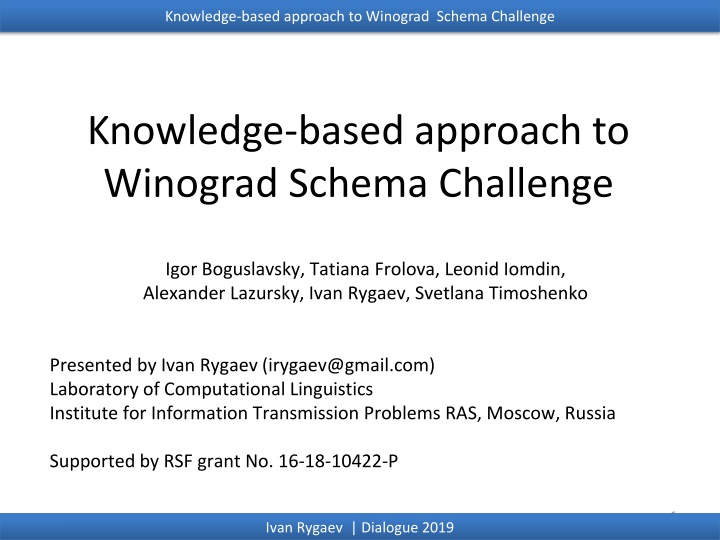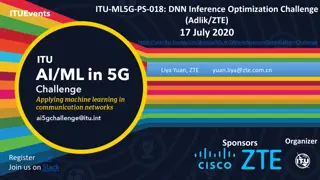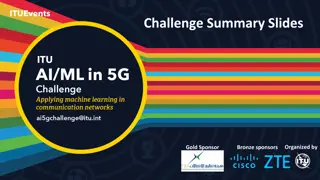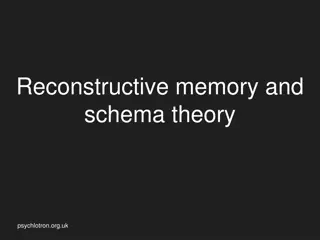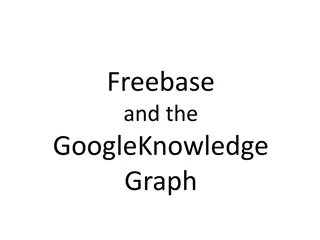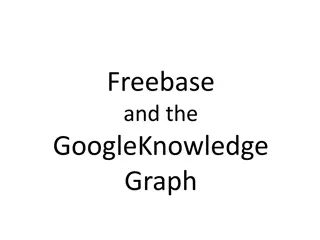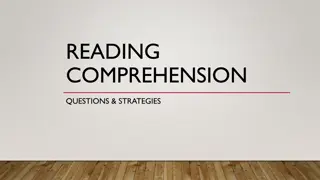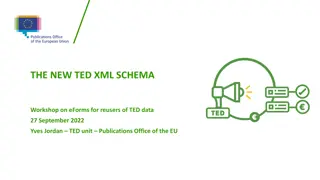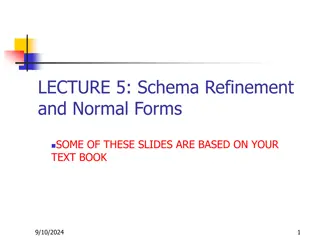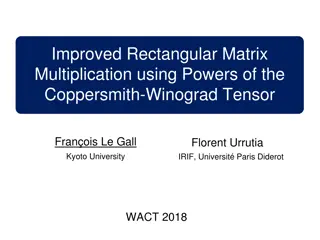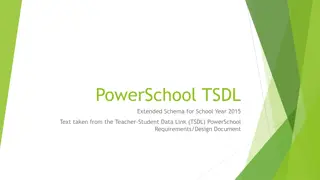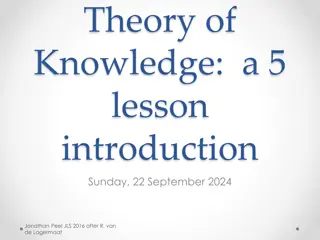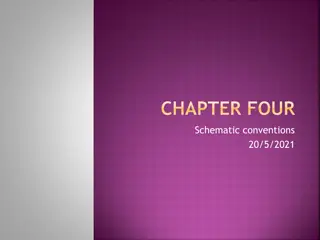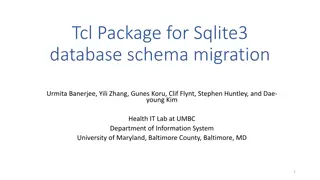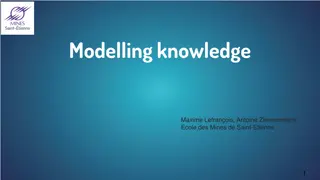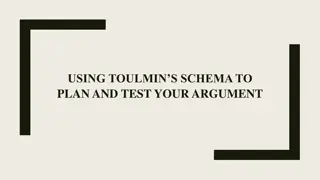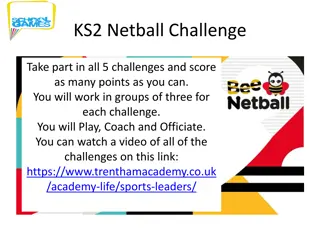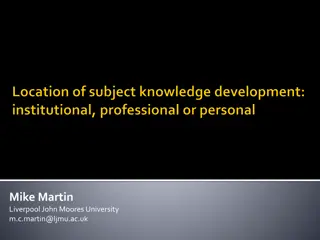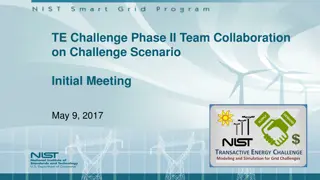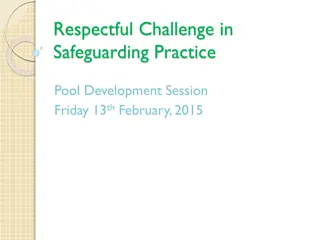Knowledge-Based Approach to Winograd Schema Challenge
Method proposed to resolve anaphoric pronouns in the Winograd Schema Challenge using a knowledge-based semantic analyzer called SemETAP. The study challenges the Turing Test's effectiveness and explores the structure of Winograd schemas for better evaluation. Presented by Ivan Rygaev in Dialogue 2019.
Download Presentation

Please find below an Image/Link to download the presentation.
The content on the website is provided AS IS for your information and personal use only. It may not be sold, licensed, or shared on other websites without obtaining consent from the author.If you encounter any issues during the download, it is possible that the publisher has removed the file from their server.
You are allowed to download the files provided on this website for personal or commercial use, subject to the condition that they are used lawfully. All files are the property of their respective owners.
The content on the website is provided AS IS for your information and personal use only. It may not be sold, licensed, or shared on other websites without obtaining consent from the author.
E N D
Presentation Transcript
Knowledge-based approach to Winograd Schema Challenge Knowledge-based approach to Winograd Schema Challenge Igor Boguslavsky, Tatiana Frolova, Leonid Iomdin, Alexander Lazursky, Ivan Rygaev, Svetlana Timoshenko Presented by Ivan Rygaev (irygaev@gmail.com) Laboratory of Computational Linguistics Institute for Information Transmission Problems RAS, Moscow, Russia Supported by RSF grant No. 16-18-10422-P 1 Ivan Rygaev | Dialogue 2019
Knowledge-based approach to Winograd Schema Challenge Abstract We propose a method to resolve anaphoric pronouns in the framework of Winograd Schema Challenge by means of SemETAP a knowledge-based semantic analyzer. Ivan Rygaev | Dialogue 2019
Knowledge-based approach to Winograd Schema Challenge Table of contents Winograd Schema Challenge Related work SemETAP semantic analyzer Our approach to WSC Ivan Rygaev | Dialogue 2019
Knowledge-based approach to Winograd Schema Challenge Table of contents Winograd Schema Challenge Related work SemETAP semantic analyzer Our approach to WSC Ivan Rygaev | Dialogue 2019
Knowledge-based approach to Winograd Schema Challenge Turing test criticism Turing Test was formally passed by a chat-bot Eugene Goostman in 2014 But does the chat-bot think? Is conversation the right way of evaluation? Subjective Encourage verbal acrobatics and trickery Turing Test requires deception Must fool an interrogator that it is a person Do we need this from an intelligent machine? For which purposes? Ivan Rygaev | Dialogue 2019
Knowledge-based approach to Winograd Schema Challenge Winograd schemas A better test was proposed in Levesque 2011 The trophy doesn t fit in the brown suitcase because it s too big. What is too big? the trophy the suitcase Joan made sure to thank Susan for all the help she had given. Who had given the help? Joan Susan Terry Winograd provided the first example in 1970 Ivan Rygaev | Dialogue 2019
Knowledge-based approach to Winograd Schema Challenge Winograd schema structure Anaphora resolution problem There are two potential antecedents in the sentence Linguistic features, collocation statistics and selectional restrictions do not help much Changing a special word in the sentence reverts the correct answer (big -> small) The trophy doesn t fit in the brown suitcase because it s too small. What is too small? the trophy the suitcase Ivan Rygaev | Dialogue 2019
Knowledge-based approach to Winograd Schema Challenge Commonsense knowledge People are good on Windograd Schemas Tests show 91-92% correct answers What is required to get the right answer? Understanding of the verb fit if A fits into B then A must be smaller than B. Understanding of the connective because Changing it to in spite of also reverts the answer. Implicit information must be extracted from the text to pass the test Ivan Rygaev | Dialogue 2019
Knowledge-based approach to Winograd Schema Challenge More examples The wrong answer need not be logically inconsistent: Tom threw his bag down to Ray after he reached the top of the stairs. Who reached the top of the stairs? Tom Ray Alternate special word need not be the opposite: The man couldn't lift his son because he was so weak/heavy. Who was weak/heavy? the man the son Ivan Rygaev | Dialogue 2019
Knowledge-based approach to Winograd Schema Challenge Competition The first competition was held in July 2016 at IJCAI conference in New York It was organized in two rounds: 1. Sentences from real texts (children's literature) rather than constructed ones. They exhibited all the properties of WS but did not have an alternative variant. 2. Actual constructed WSs with an alternative variant Motivation for two rounds: Not to reveal WSs to contestants who are not ready yet Increase relevance of the test by using real examples Ivan Rygaev | Dialogue 2019
Knowledge-based approach to Winograd Schema Challenge Competition There were 60 questions in the first round and 60 in the second one. To proceed to the second round a contestant had to score at least 90% correct in the first one. None of the solutions achieved that score The second round was not held The big prize was offered to the team who would achieve at least 90% in both rounds Three smaller prizes were offered to the top programs achieved at least 65% in the first round Ivan Rygaev | Dialogue 2019
Knowledge-based approach to Winograd Schema Challenge Competition results Six solutions of four teams where presented: Random answering could yield 45% Ivan Rygaev | Dialogue 2019
Knowledge-based approach to Winograd Schema Challenge Competition results assessment None of the solutions got over the 65% threshold to receive even the smaller prize Four of the six programs showed scores around the chance level or even worse The next test had been scheduled for AAAI-2018 (Feb), but it was cancelled Several participants dropped out at the last minute Text understanding by machines is an unsolved task yet Ivan Rygaev | Dialogue 2019
Knowledge-based approach to Winograd Schema Challenge Table of contents Winograd Schema Challenge Related work SemETAP semantic analyzer Our approach to WSC Ivan Rygaev | Dialogue 2019
Knowledge-based approach to Winograd Schema Challenge Machine learning Rahman and Ng 2012 Narrative chains, Google API, FrameNet, heuristic and machine-learned polarity, connective-based relations, etc. Haoruo Peng et al. 2015 Predicate Schemas learned from the Gigaword corpus, Wikipedia, Web Queries, polarity information, etc. Quan Liu et al 2016 (competition winner) Knowledge Enhanced Embeddings (KEE) trained using WordNet, ConceptNet, Cyc, CauseCom Trinh and Le 2018 Language models trained on big corpora LM-1-Billion, CommonCrawl, SQuAD, Gutenberg Books Ivan Rygaev | Dialogue 2019
Knowledge-based approach to Winograd Schema Challenge Knowledge-based Sch ller 2014 Inferences based on pragmatic effects from Relevance Theory in a graph framework Bailey et al. 2015 A series of axioms and inference rules for event correlation A fits into B <-> B is big Sharma et al. 2015 Knowledge is extracted from the web on demand using a modified test phrase as a pattern. A semantic analyzer is used to match the found sentence with the original one. Ivan Rygaev | Dialogue 2019
Knowledge-based approach to Winograd Schema Challenge Transparency Eric Mueller 2016: Computers should be more open and understandable Computers should provide advice and explain it People will decide whether to accept it or not Transparency generates trust and makes fixes easier Knowledge-based vs machine learning Knowledge-based approaches have a higher transparency and explanatory power than machine learning techniques Deep knowledge can hardly be acquired by machine learning (yet) Ivan Rygaev | Dialogue 2019
Knowledge-based approach to Winograd Schema Challenge Table of contents Winograd Schema Challenge Related work SemETAP semantic analyzer Our approach to WSC Ivan Rygaev | Dialogue 2019
Knowledge-based approach to Winograd Schema Challenge ETAP-4 linguistic processor Comprehensive support for Russian and English Syntactic parsing Building dependency trees Machine translation On the level of deep syntactic structures or UNL UNL conversion and deconversion Universal Networking Language Deep semantic analysis Logical form with inferences Ivan Rygaev | Dialogue 2019
Knowledge-based approach to Winograd Schema Challenge ETAP-4 resources Combinatorial dictionary More than 100 000 entries for Russian, English and UNL Syntactic and semantic features Government patterns Lexical functions Dictionary rules for specific words processing Transformation rules For syntactic structure creation and modification Written in a formal language FORET Ontology Ivan Rygaev | Dialogue 2019
Knowledge-based approach to Winograd Schema Challenge SemETAP semantic text analyzer SemETAP (Boguslavsky et al. 2015, 2018) A module of ETAP-4 linguistic processor Translates an original sentence into a language- independent semantic representation in a formal language Applies inference rules (semantic concept decomposition, common sense axioms) to infer new knowledge Semantic representation Based on Semantic Web standards (OWL, RDF, SPARQL) Can be seen as a semantic graph or a formula in predicate logic Ivan Rygaev | Dialogue 2019
Knowledge-based approach to Winograd Schema Challenge SemETAP resources Linguistic modules and resources Reused from ETAP-4 itself Ontology Repository of individuals Inference rules The depth of understanding grows with the number of inferences we can draw from the text More inferences mean better understanding Ivan Rygaev | Dialogue 2019
Knowledge-based approach to Winograd Schema Challenge Semantic analysis steps Syntactic tree Basic semantic structure Words are translated to semantic concepts and syntactic relations to semantic roles (roughly) Enhanced semantic structure Inference rules are applied to extend the semantic graph Ivan Rygaev | Dialogue 2019
Knowledge-based approach to Winograd Schema Challenge Inference rules Declarative rules In the form of implication (if-then) Written in Etalog formal language (Rygaev 2018) Datalog (semantically) compatible language Requires minimal mathematical background Syntax made closer to natural language More than 400 rules at the moment Most of them are concept decomposition rules Similar to word definitions in an explanatory dictionary but in a formal language Ivan Rygaev | Dialogue 2019
Knowledge-based approach to Winograd Schema Challenge Event decomposition Preconditions Ivan bought a book from Masha -> Masha had had a book Results Ivan bought a book from Masha -> Ivan has a book Subevents Ivan bought a book from Masha -> Masha gave Ivan a book Presuppositions Ivan does not know that Peter arrived -> Peter arrived Participants objectives & attitudes Ivan defeated Peter -> Good for Ivan, bad for Peter Ivan Rygaev | Dialogue 2019
Knowledge-based approach to Winograd Schema Challenge Decomposition rule example Ivan Rygaev | Dialogue 2019
Knowledge-based approach to Winograd Schema Challenge Plausible expectations Invited inferences (implicatures) Inferences which are most likely true based on all the information we have so far John was allowed to smoke -> John smoked (probably) Marked in the graph with medium degree confidence Non-monotonic logic Expectations can be confirmed or cancelled John was allowed to smoke, but he did not Made hidden when a corresponding confirming or disproving subgraph of maximal degree exists Ivan Rygaev | Dialogue 2019
Knowledge-based approach to Winograd Schema Challenge Table of contents Winograd Schema Challenge Related work SemETAP semantic analyzer Our approach to WSC Ivan Rygaev | Dialogue 2019
Knowledge-based approach to Winograd Schema Challenge Semantic consistency Our approach to WSC Build two variants of the enhanced semantic structure one for each potential antecedent Check which variant is more consistent Consistency definition Consistent variant contains the same or unifiable subgraph more than once Two different parts of the sentence produce the same (unifiable) inference Ivan Rygaev | Dialogue 2019
Knowledge-based approach to Winograd Schema Challenge Example James asked Robert for a favor but he refused James asked Robert for a favor but Robert refused James asked Robert for a favor but James refused Two events of asking in the enhanced structure From the first part of the sentence From the precondition of the refusal event (inferred) Unification In the first variant the addressee is the same, other arguments are unifiable In the second variant the addressees are different Ivan Rygaev | Dialogue 2019
Knowledge-based approach to Winograd Schema Challenge Experimental results We carried out two series of experiments: On a development corpus of Winograd schemas On a test corpus of Winograd schemas Development corpus Open WSs phrases translated into Russian Were open to us while developing the algorithm and populating the knowledge Test corpus Phrases were not revealed but the lexicon was known and description for the missing part was added to the system Ivan Rygaev | Dialogue 2019
Knowledge-based approach to Winograd Schema Challenge Development corpus results Examples: The perch swallowed the worm, it was hungry/tasty Peter gave Ivan a candy, because he was (not) hungry Peter knocked at Ivan s door, but he didn t (receive a) reply Ivan offended Peter so we defended/punished him Results In most phrases the antecedents were identified correctly Explanation is understandable by humans Conclusion The algorithm solves WSC if accurate knowledge is given Ivan Rygaev | Dialogue 2019
Knowledge-based approach to Winograd Schema Challenge Test corpus results Examples: Peter gave money to Ivan, because he was poor/rich Peter defeated Kolya because he played well/poorly John got angry at Bill, although he is kind (was not guilty) Vasya begged Ivan to stay at home but he refused/failed Results Only 54% of antecedents were identified correctly, which is not much but still noticeably more than the random choice All failures were due to the incomplete knowledge Conclusion It is hard to explicate all details without seeing the phrases Ivan Rygaev | Dialogue 2019
Knowledge-based approach to Winograd Schema Challenge Conclusions A solution to Winograd Schemas was proposed Based on explicit knowledge stored in the dictionary, ontology and inference rules Proof of concept: the solution works fine given all the necessary knowledge is presented in the system Provides human understandable explanations Limitation: Time-consuming It is hard to explicate all necessary knowledge in advance Computational power is not leveraged Hybrid approach could be the answer Ivan Rygaev | Dialogue 2019
Knowledge-based approach to Winograd Schema Challenge References 1. Bailey D., A. Harrison, Yu. Lierler, V. Lifschitz, and J. Michael. (2015), The Winograd schema challenge and reasoning about correlation. In: Working Notes of the Symposium on Logical Formalizations of Commonsense Reasoning. Boguslavsky I., V. Dikonov, L. Iomdin, A. Lazursky, V. Sizov, S. Timoshenko. (2015), Semantic Analysis and Question Answering: a System Under Development. In: Computational Linguistics and Intellectual Technologies. Papers from the Annual International Conference Dialogue (2015), p.62. Boguslavsky I., Frolova T., Iomdin L., Lazursky A., Rygaev I., Timoshenko S. (2018), Semantic analysis with inference: high spots of the football match. Computational Linguistics and Intellectual Technologies: Proceedings of the International Conference Dialogue 2018 , Moscow, May 30 June 2. Haoruo Peng, Daniel Khashabi, and Dan Roth. (2015), Solving hard coreference problems. In: Proceedings of the 2015 Conference of the North American Chapter of the Association for Computational Linguistics: Human Language Technologies, pages 809 819. Levesque H. (2011), The Winograd Schema Challenge. In: AAAI Spring Symposium: Logical Formalizations of Commonsense Reasoning. Mueller E. (2016), Transparent Computers: Designing Understandable Intelligent Systems. Createspace Independent Publishers. 2. 3. 4. 5. 6. Ivan Rygaev | Dialogue 2019
Knowledge-based approach to Winograd Schema Challenge References 7. Quan Liu, Hui Jiang, Zhen-Hua Ling, Xiaodan Zhu, Si Wei, Yu Hu. (2016), Combing Context and Commonsense Knowledge Through Neural Networks for SolvingWinograd Schema Problems. arXiv:1611.04146v1 [cs.AI] 13 Nov 2016. Rahman A., V. Ng. (2012), Resolving complex cases of definite pronouns: the Winograd schema challenge. In: Proceedings of the 2012 Joint Conference on Empirical Methods in Natural Language Processing and Computational Natural Language Learning, pages 777 789. Association for Computational Linguistics. Rygaev I. (2018), Etalog - a natural-looking knowledge representation formalism // Proceedings of ITaS 2018 School and Conference (http://itas2018.iitp.ru/media/papers/1570472169.pdf). 10. Sch ller P. (2014), Tackling Winograd schemas by formalizing relevance theory in knowledge graphs. In: Fourteenth International Conference on the Principles of Knowledge Representation and Reasoning. 11. Sharma A., Nguyen Ha Vo, Somak Aditya, and Chitta Baral. (2015), Towards addressing the Winograd schema challenge-building and using a semantic parser and a knowledge hunting module. In IJCAI, pages 1319 1325. 12. Trieu H. Trinh, Quoc V. Le. (2018), A Simple Method for Commonsense Reasoning. arXiv:1806.02847v1 [cs.AI] 7 Jun 2018 8. 9. Ivan Rygaev | Dialogue 2019
Knowledge-based approach to Winograd Schema Challenge Thank you for your attention! Questions? Ask now or send an email to irygaev@gmail.com Ivan Rygaev | Dialogue 2019
